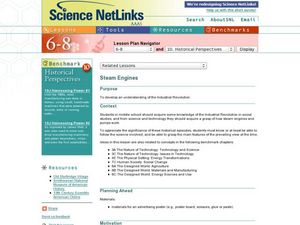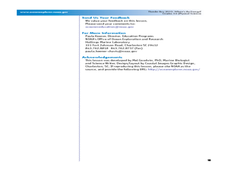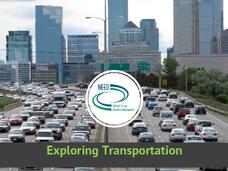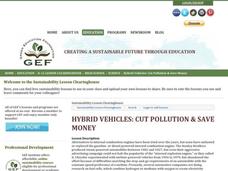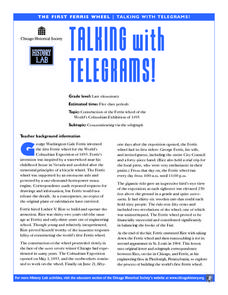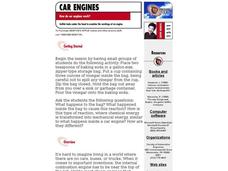American Chemical Society
Soda Can Steam Engine
Steam engines have been around since the late 1600s, yet most pupils don't know how they work. Using an soda can, the instructor builds a simple steam engine for scholars to observe. Through a discussion, young scientists learn about the...
Curated OER
Steam Engines
Students investigate the invention of the steam engine. For this technology lesson, students investigate the advancement of technology over time. They relate science and technology together.
Curated OER
Where's the Energy
Students research energy conversions. For this energy lesson, students describe the basic operation of a steam engine. They explain the energy conversions in the steam engine's operation.
Curated OER
Industrial Revolution: A Definition
America sure did have a few growing pains during the Industrial Revolution. Share the problems, causes, effects, and reformation that marked the turn of the century and shift in policy during US industrialization. This slide show...
Curated OER
Industrial Revolution in America: Exploring the Effects of the Heat Engine on the Growth of Cities
Young scholars research the development of the steam engines. In this US history lesson, students analyze the impact of this invention to civilization. They discuss the events leading to the growth and development of different cities.
Curated OER
All Steamed Up
Learners examine the energy conversions and simple machines are involved in the operation of a steam engine. They make a replica of a small steam engine.
Beacon Learning Center
Growth of a Revolution-The Industrial Revolution
How did changes of the agricultural revolution in eighteenth century Great Britain influence the Industrial Revolution that followed? How were inventions and processes of the Industrial Revolution interrelated? This resource includes a...
Curated OER
How Do Car Engines Work?
High schoolers perform an experiment which simulates what happens inside an internal combustion engine. They explain how the chemical reaction they witnessed is similar to what happens inside the car engine.
Dr. Seuss Enterprises
Read Across America
Celebrate the whimsical world of Dr. Seuss on Read Across America Day with a collection of science, technology, engineering, the arts, and mathematics activities, each linked to a popular Dr. Seuss story.
National Energy Education Development Project
Exploring Transportation
Did you know horsepower is actually based on the power of a horse? 60 horse power is the equivalent of being pulled by a team of 60 horses! Viewers will learn other interesting facts like this from a presentation that begins with the...
Curated OER
Machines: Designing Form and Function
Students design a boat model with simplified steam engine. In this ecology lesson, students compare renewable and nonrenewable energy sources. They determine the efficiency of their boat model.
Curated OER
Hybrid Vehicles: Cut Pollution and Save Money
Math and science meet in this instructional activity on hybrid electric automobiles. This 24-page resource provides everything you need for teaching a instructional activity that compares the use of internal combustion engines to hybrid...
Curated OER
Industrial Revolution
Students cite the importance of the steam engine, cotton gin and steel making process. They describe conditions in cities due to increased industrialization. They explain how the living and working conditions led to the development of...
Curated OER
Invent It!
Learners explore invention and unveiling of world's first Ferris wheel, analyze photographs and poster of first Ferris wheel, and discuss engineering achievements of Ferris wheel, including how it worked, how it was built, and its...
Curated OER
Telegrams!
Students read and analyze original telegrams to learn about people involved in and process of building the world's first Ferris wheel, examine correspondence between inventor and engineer to understand planning necessary to build Ferris...
American Institute of Architects
Architecture: It's Elementary!—Fifth Grade
Young citizens construct an understanding of urban planning in this cross-curricular unit. Covering every aspect of city development from the political, economic, and social influences to sustainable building practices, this 10-lesson...
Curated OER
Car Engines
Young scholars create piston systems and explore the conversion of linear to rotary motion that propels a car. In this motion lesson, students build and test a model piston/crankshift system and discover why there is a maximum limit to...
Carnegie Mellon University
How Power Plants Work 2
For this second of three lessons on power plants, future engineers find out how we generate electricity and how coal-powered plants operate. They work in small groups to make electromagnet generators to light LED bulbs. A set of...
Curated OER
"Finding" Horsepower
Students investigate horsepower as a unit of power. They examine history and discover that scientists and engineers of high achievement are considered to be among the most valued contributors to their culture.
California Department of Education
Possible Careers
Is a STEM career the right choice for me? Lesson four in a six-part career and college readiness series introduces seventh graders to the world of STEM occupations. Individuals use their Holland code results to select, research, and...
Curated OER
Energy Conversion
Sixth graders study energy conversions. They watch a demonstration of a working engine and make a chart explaining the energy conversions taking place. They build a simple electric motor and research other types of electric generators.
Curated OER
ME*Pro App
For this secondary mathematics lesson, learners investigate the uses and capabilities of a TI-89 application designed for mechanical engineering students. The app contains over 700 pieces of reference information and organized into...
Curated OER
John Fitch: Pioneer Steamboat Inventor
Students explore the transportation revolution brought about through the use of steam power to move boats over water. They practice note taking skills by taking notes from an article.
American Museum of Natural History
Rising CO2! What Can We Do?
It is colorless and scentless, but it makes a large impact on the environment. Learners explore carbon dioxide emissions and what they mean for the environment using an interactive graph. They review changes over time and how they impact...



